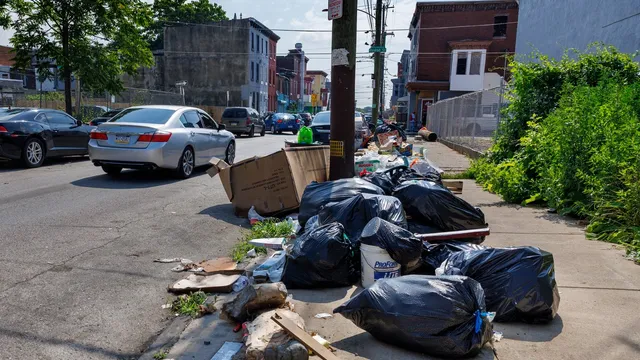
Philadelphia judge mandates return of 911 dispatchers during critical strike
2025-07-02 13:27- Over 9,000 city workers in Philadelphia initiated a strike demanding better pay and working conditions.
- A judge ordered more than 200 911 dispatchers to return to work, citing threats to public safety.
- Residents support the striking workers but express concern about the accumulation of trash and potential health risks.
Express your sentiment!
Insights
In Philadelphia, the largest strike among city workers in decades has led to significant disruptions in essential services, particularly affecting the 911 emergency response system. This strike commenced on a Tuesday, where over 9,000 members of AFSCME District Council 33 walked off the job after negotiations for better wages and working conditions failed. The city, facing an immediate threat to public safety, filed a complaint citing that trained dispatchers are irreplaceable for the proper operation of the emergency call center. The absence of trained staff further strained the 911 call center, especially highlighted by a recent house explosion incident that required urgent assistance. As the situation escalated, a judge intervened hours into the strike, issuing a preliminary injunction that mandated dispatchers to resume their duties. The city argued that there was no substitute for the specialized training that dispatchers undergo, which spans over 10 weeks in total. Councilmember Jamie Gauthier noted the critical role of dispatchers, emphasizing their challenging work conditions and the need for fair compensation. In the wake of the strike, the city deployed police officers to temporarily fill in for the dispatchers, yet acknowledged that this was not a viable solution due to the unique skills required for emergency response. With the strike also impacting sanitation services, residents have noted increasing garbage accumulation on the streets, leading to frustration and concerns regarding public hygiene. The city established 63 temporary drop-off sites for residents to manage waste, but many fear that without proper sanitation workers, the situation could worsen quickly. Support for the workers' demands remains strong among the residents, who recognize the importance of fair wages and working conditions for city employees. As the strike continues and negotiations remain stagnant, there is hope on the streets for a resolution that meets the needs of workers while ensuring the city can maintain essential services that safeguard public health and safety. The city officials are under pressure to reach an agreement that not only addresses the workers’ grievances but also restores the essential services that residents depend on.
Contexts
The impact of the Philadelphia 911 dispatchers strike on public safety is a topic of significant concern for the community. When dispatchers engage in a strike, the immediate effect is a disruption in the communication flow between citizens in need of assistance and the emergency services tasked with providing that help. Dispatchers play a crucial role in ensuring timely responses to emergencies, including medical crises, fires, and law enforcement needs. A prolonged strike could lead to delays in emergency response times, which may exacerbate dangerous situations and potentially lead to loss of life or increased injury rates. The absence of efficient dispatching can result in confusion and miscommunication, leaving first responders unable to adequately assess and respond to emergency situations effectively, which undermines the public's safety and confidence in emergency services. In addition to delayed responses, a strike can create panic and uncertainty within the community. Residents may feel less secure knowing that emergency services are not operating at full capacity, which can lead to increased anxiety and fear of crime or disasters. The psychological impact of feeling abandoned in times of crisis cannot be underestimated, as it affects community cohesion and the overall perception of safety. Law enforcement agencies may be forced to rely more heavily on existing personnel, which could spread their resources thinner and affect their ability to maintain regular patrols and community policing efforts. This situation may incentivize individuals to take protective measures into their own hands, potentially leading to a rise in vigilante actions and further complicating the role of first responders. Another significant aspect to consider is the long-term effects of a dispatchers strike on public safety systems. A strike, even if temporally resolved, can result in lasting changes to how emergency services are perceived and structured. Public trust in these services can diminish, leading to increased public scrutiny and calls for reform. As emergency response systems adapt to the disruption, necessary changes in protocols may result that could ultimately impact service quality and efficiency. Maintaining a robust communication infrastructure and adequate staffing is essential for a reliable response framework. Continuous training and evaluation efforts during and after the strike period will be crucial to recover lost ground and to re-establish the community's trust in the emergency response system. In conclusion, the strike of Philadelphia 911 dispatchers poses grave challenges to public safety. The potential for increased injuries, declines in trust, and disruptions to community stability are pressing concerns that need to be addressed urgently. Stakeholders must engage in dialogue to ensure that the issues leading to such labor actions are resolved amicably, and that the resilience of the emergency services is fortified. The focus should be on creating a sustainable and supportive environment for dispatchers that enables them to perform their critical functions, ultimately contributing to a safer community. Policymakers, community leaders, and emergency service management must collaborate to prevent such disruptions in the future, ensuring that the public remains safe and assured of timely assistance in emergencies.